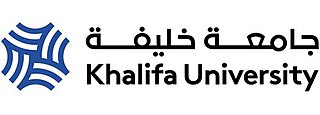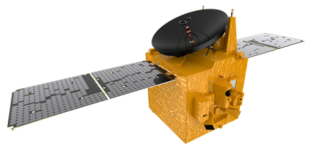Related Research Articles

The economy of the United Arab Emirates is the 5th largest in the Middle East, with a gross domestic product (GDP) of US$421 billion in 2020.

The United Arab Emirates, or simply the Emirates, is a country in Western Asia. It is located at the eastern end of the Arabian Peninsula, and shares borders with Oman and Saudi Arabia, while having maritime borders in the Persian Gulf with Qatar and Iran. Abu Dhabi is the nation's capital, while Dubai, the most populous city, is an international hub.

Dubai is the most populous city in the United Arab Emirates (UAE) and the capital of the Emirate of Dubai. Established in the 18th century as a small fishing village, the city grew rapidly in the early 21st century into a cosmopolitan metropolis with a focus on tourism and hospitality. Dubai is one of the world's most popular tourist destinations. It has the second most five-star hotels in the world and the tallest building in the world, the Burj Khalifa.

Cloud seeding is a type of weather modification that aims to change the amount or type of precipitation that falls from clouds by dispersing substances into the air that serve as cloud condensation or ice nuclei, which alter the microphysical processes within the cloud. Its effectiveness is debated; some studies have suggested that it is "difficult to show clearly that cloud seeding has a very large effect". The usual objective is to increase precipitation, either for its own sake or to prevent precipitation from occurring in days afterward.

The Burj Khalifa, known as the Burj Dubai prior to its inauguration in 2010, is a skyscraper in Dubai, United Arab Emirates. With a total height of 829.8 m (2,722 ft) and a roof height of 828 m (2,717 ft), the Burj Khalifa has been the tallest structure and building in the world since its topping out in 2009, supplanting Taipei 101, the previous holder of that status.

Sheikh Khalifa bin Zayed bin Sultan Al Nahyan is the president of the United Arab Emirates, the Emir of Abu Dhabi and the supreme commander of the United Arab Emirates Armed Forces since 2004. He has also served as the chairman of the Supreme Petroleum Council since the late 1980s.
Emaar Properties or Emaar Developments is an Emirati multinational real estate development company located in the United Arab Emirates. It is a public joint-stock company, listed on the Dubai Financial Market, and has a valuation of US$15.5 billion as of June 2021. The company operates internationally providing property development and management services. With six business segments and 60 active companies, Emaar has collective presence in 36 markets across the Middle East, North Africa, Pan-Asia, Europe and North America.

Mansour bin Zayed bin Sultan bin Zayed bin Khalifa Al Nahyan, often referred to as Sheikh Mansour, is an Emirati politician who is the deputy prime minister of the United Arab Emirates, minister of presidential affairs, billionaire and member of the royal family of Abu Dhabi. He is the half brother of the current President of the UAE, Khalifa bin Zayed Al Nahyan, and is married to one of the daughters of Mohammed bin Rashid Al Maktoum, the ruler of Dubai.

Sheikh Nahyan bin Mubarak Al Nahyan heads the United Arab Emirates Ministry of Culture, Youth, and Social Development.

Gulf Medical University (GMU), established in Ajman, UAE in 1998, is one of the largest private medical universities in the Middle East region. It has various programs in medicine and health sciences.

Abu Dhabi is the capital and the second-most populous city of the United Arab Emirates. It's also the capital of the Emirate of Abu Dhabi. The city of Abu Dhabi is located on an island in the Persian Gulf, off the Central West Coast. Most of the city and the Emirate reside on the mainland connected to the rest of the country. As of 2021, Abu Dhabi's urban area had an estimated population of 1.5 million, out of 2.9 million in the emirate of Abu Dhabi, as of 2016. The Abu Dhabi Investment Authority is headquartered in the city, and was the world's 5th largest sovereign wealth fund in 2021. Abu Dhabi itself has over a trillion US dollars worth of assets under management in a combination of various sovereign wealth funds headquartered there.

Khaldoon Khalifa Al Mubarak is an Emirati Government official and business leader. Al Mubarak holds senior positions within the Government of Abu Dhabi, notably as: a member of the Executive Council since 2006, a founding member of the Supreme Council for Financial and Economic Affairs, and as the founding chairman of the Executive Affairs Authority. He also fulfills key responsibilities for the UAE Federal government and has served as Presidential Special Envoy to the People's Republic of China since 2018.

The United Arab Emirates has an embassy in London while the United Kingdom maintains an embassy in Abu Dhabi and is unique in having another Embassy in Dubai, albeit with Her Britannic Majesty's Consul-General to Dubai and the Northern Emirates, as opposed to a separate British Ambassador. The UAE-UK relations have been described as a "special relationship".

The Mohammed Bin Rashid Space Centre, is a Dubai government organisation working on the UAE space programme, which includes various space satellite projects, the Emirates Mars Mission, the Emirates Lunar Mission, and the UAE astronaut programme. The centre actively works to promote space science and research in the region. The centre encompasses the Emirates Institution for Advanced Science and Technology (EIAST).

Khalifa University is a public research university located in Abu Dhabi, United Arab Emirates, with a satellite campus in Sharjah. It was ranked as the 183rd best university in the world by QS world university rankings of 2022.

The Second Libyan Civil War was a multilateral civil war that lasted from 2014 to 2020 in the North African country of Libya fought between different armed groups, mainly the House of Representatives (HoR) and the Government of National Accord.

KhalifaSat, also known as DubaiSat-3, is a remote sensing Earth observation satellite that was designed and built at the Space Technology Laboratories of the Mohammed bin Rashid Space Centre in Dubai. It is considered the first entirely Emirati-made satellite. It launched into orbit on 30 October 2018 from Japan's Tanegashima Space Center using the Korean Satrec SI-300 bus.

The Emirates Mars Mission is a United Arab Emirates Space Agency uncrewed space exploration mission to Mars. The Hope orbiter was launched on 19 July 2020, and went into orbit around Mars on 9 February 2021.
The United Arab Emirates Research Program for Rain Enhancement Science (UAEREP) is a global research initiative offering a grant of US$5 million over a three-year period to be shared by up to five winning research projects in the field of rain enhancement.

Cloud seeding in the United Arab Emirates is a strategy used by the government to address water challenges in the country. Cloud seeding is also referred to as man made precipitation and artificial rain making. The United Arab Emirates is one of the first countries in the Persian Gulf region to use cloud seeding technology. UAE scientists use cloud seeding technology to supplement the country's water insecurity, which stems from the extremely hot climate which is being amplified by global warming. They use weather radar to continuously monitor the atmosphere of the country. Forecasters and scientists have estimated that cloud seeding operations can enhance rainfall by as much as 30-35% percent in a clear atmosphere, and up to 10-15% in a more humid atmosphere. This practice has caused concerns regarding the impact on the environment because it is difficult to predict the long-term global implications.
References
- ↑ "PROF. LINDA ZOU". Khalifa University. Retrieved 26 February 2020.
- ↑ "Bringing in the rain: Has the UAE's cloud-seeding program gone too far?". WIRED. Retrieved 26 February 2020.
This article needs additional or more specific categories .(March 2020) |